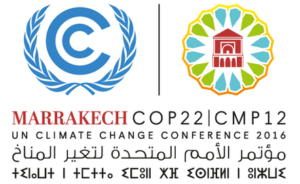African Heads of State issue declaration on climate resilience
 African Heads of State and Governments at the first African Action Summit on climate change declared that although Africa contributed the least in greenhouse gas it is the most affected by climate change.
African Heads of State and Governments at the first African Action Summit on climate change declared that although Africa contributed the least in greenhouse gas it is the most affected by climate change.
They said the consequences may jeopardise peace, security and sustainable development of the continent, calling for concrete and substantial commitment of Africa to contribute to global efforts to combat climate change.
The summit was at the invitation of Mohammed VI, King of Morocco on the sidelines of the 22nd Conference of the Parties to the United Nations Framework Convention on Climate Change (COP22) in Marrakech, Morocco.
Some of the Heads of state who attended were from Liberia, Mali, Sierra Leone, Senegal Nigeria, Zambia, Burkina Faso, Soudan, Rwanda and Cote D’voire.
Also in attendance were the, UN Secretary General, the Presidents of China and France and the President of the African Development Bank, COP22 President, UNFCCC Executive Secretary among other delegates.
The heads of state also reaffirmed the importance of adequate implementation of the Sustainable Development Goals, based on the Rio principles particularly that of “common but differentiated responsibilities” to rise to the challenge of climate change.
They thanked King Mohammed, for taking the initiative to convene the Summit for the continent’s co-emergence underscoring the importance for the continent to speak with one voice in order to defend its interests more efficiently.
They called on him and the Chairman of the African Union, to work for the implementation of the Declaration, particularly in regard to the coordination of and follow-up to priority initiatives in the areas of combating climate change and promoting sustainable development, as well as mobilising the continent’s bilateral and multilateral partners.
They suggested the establishment of three Committees dedicated to: the Sahel region, presided by the Republic of Niger, the Congo Basin Region, presided by the Republic of the Congo and the Island States, presided by the Republic of Seychelles.
The Heads of state declared their desire to work together collectively towards an Africa that was resilient to climate change and that shaped its destiny, through sub-regional and regional approaches.
The declaration stated that the Heads of state would commit to promoting the adaptation measures and policies required, making sure they served as catalysts for profound economic and social structural transformation in Africa.
“Consolidating our respective commitments to tackle the effects of climate change in order to give more coherence to our strategies and move forward together, speeding up the implementation of initiatives that have already been identified or launched, not only by building on our own resources, but also by mobilising multilateral and bilateral donors as well as non-state actors.
“These include: initiatives aimed at enhancing our continent’s resilience to the threats of climate change, in particular the Africa Adaptation Initiative, the Adaptation of African Agriculture initiative, known as Triple A, the Great Green Wall for the Sahara and the Sahel project, the Security, Stability and Sustainability initiative, the Rural Resilience initiative and the Forests in the Mediterranean Region and the Sahel initiative.
“Others are, initiatives in favour of an African sustainable co-emergence, in particular the Africa Renewable Energy Initiative, the Conservation of the Lake Chad Basin Ecosystem, the Blue Growth initiative, the African Clean Energy Corridor and the Blue Fund for the Congo Basin, ” the declaration said.
They committed themselves to encourage and facilitate the participation of the private sector in mobilising additional capabilities and funding to rise to the challenge of climate change.
They called on our strategic partners “to strengthen our cooperation so as to respond to the African ambition for the achievement of inclusive sustainable development, provide effective and concrete support for the fulfillment of this ambition by increasing public funding, facilitating access to climate finance and rebalancing financing to promote adaptation, capacity building and technology transfer”.
Source: GNA
